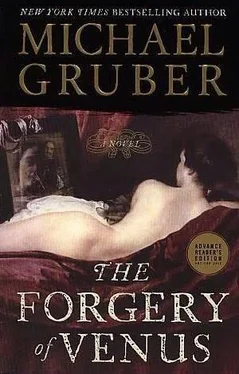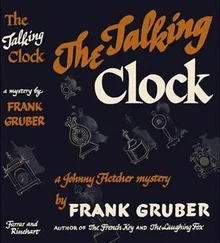“Is it a fake? You seem to be particularly interested in fakes, Wilmot. I wonder why. Come with me, I want to show you something else.”
We left the bedroom and went back to the study. Krebs reached up to a bookshelf and took down a large-format art book. He motioned me to sit down on one of his delicious leather chairs and laid it on my lap. It had a realistic painting of a beautiful red-haired woman on the cover. She was reclining in a plush purple chair and holding to her crotch a wooden hand mirror, in which was reflected a penis. In large block letters a title: WILMOT. Soft covers, but expensively printed. My eyes blurred; I blinked. Pressure began in my temples and the dense German dinner began to stir in my belly.
“What the hell is this?” I asked.
“It’s a catalog raisonée of your show at the Whitney, a few years ago,” said Krebs.
I ignored the text and paged through the plates. I recognized some of the work from my first and only gallery show, and the others were just like the paintings in the Enso Gallery and the thing on the easel in the Hudson Street loft. I didn’t know what to say, couldn’t really have said anything, my mouth so dry, my speech centers shut down for the night.
“Take it,” said Krebs. “Study it. Maybe it will bring some memory-”
I shot to my feet, flinging the book away from me like some loathsome insect that had crawled unseen onto my lap, and dashed out of the room without another word. I walked through the house, not knowing where I was going, my brain frozen.
I ended up in the studio. All dark, of course; I scrabbled at the walls until I found a light switch. Why here? Good place for a suicide, lots of toxic solvents in a studio. There was a balcony too, throw a rope around the rail up there, stand on a stool, jump off.
An immense canvas set up on the easel. Smell of turpentine became stronger, someone’s been painting pictures. Not me, though.
Sound of steps coming closer, and the light’s changed too, not the harsh glare of fluorescents, but gray daylight filtering through a tall window. High ceilings in a large room with its walls covered in paintings, a mirror on one wall, coffered doors.
She says, “Are you ready for me now, sir?”
I see that I am, my palette set with colors; she’s wearing the dark blue velvet dress I asked for, the one with the silver trim.
“Yes, I am. If you please, stand over by the window, in the light. Chin up. Hold your hand so. Higher. Good.”
The underpainting is already done, and this is the final layer. I’m using smalt with calcite on the dress, touches of lapis on the collar and in the folds. I want transparency and speed; I’m working with the paint thinned to a milky liquid, a few back-and-forth swashes of the large brush lays in her face. His Majesty has asked for a group portrait of himself with his family for his private rooms, and I have been thinking about this and working on it for many weeks. He asks me often when it will be finished, and I say, soon, Majesty, and he smiles; I am well known as a phlegmatic, it is a joke of the court.
I paint in the highlights and features of her hideous face, her lank brown hair. I will have another dwarf there and a dog as well. The cuffs, the surface glitter of the gown. That is enough. I put my palette on the table.
“May I see the painting, Don Diego?”
“If you like.”
Maribárbola waddles around the easel and looks up at the canvas. After some minutes, she says, “I have never seen anything like this picture.”
I say, “There is nothing like this picture.”
“No. You have made my face as it might be seen through a misted glass. Why is that?”
“A fancy. I wish to direct the eye toward the center of the painting, and so the figures on the edges are indistinct.”
“Yes, toward the infanta and the meninas. And for another reason too: when we see something ugly we squint our eyes so as to make it blur. Yet you have made Their Majesties the most indistinct of all, there in that dusty mirror. They are ugly as well. Perhaps you have grown tired of painting them. But you know, the true center of the picture is not at all the infanta. It is you, the painter. That’s very clever. It is a clever painting. Do you think His Majesty will like it?”
“He likes all my paintings.”
“Yes. It is unusual that such a stupid man as our king should allow such cleverness in a servant, and him not a freak of nature. Cleverness is suspect in Spain, don’t you think? It suggests Jewish blood.”
“There is no Jew in my line back to the remotest antiquity.”
“Yes, so you are always saying, always, and His Majesty pretends to believe it, and therefore so must we all. You will get your knight’s cross, Don Diego, never fear. You paint the truth cleverly, as we fools speak it, and as I say, our king prizes the truth, but only from such as we.”
“I am not a freak of nature.”
“Oh, but you are, Don Diego, you are; there is no one like you in the world. I am common as bread compared to you. I am the twin sister of the infanta compared to you. However, our masters, being the greater fools, don’t comprehend it, for you have the figure of a man and not a dwarf. I assure you that if you looked like El Primo you might paint just as you do, but you would not be a chamberlain. In fact, El Primo is the cleverest man at court, or near to it, but because his head is only a yard above his feet, no one bothers about what is inside it. If I have your leave, sir, I must go now and entertain the infanta. I will somersault and play tunes upon my whistle, and hope the stupid child, whom may God bless, has not been naughty again, and if she has, that someone other than me will have the whipping. I bid you good day, sir.”
She leaves. I call for my servant, who comes to clean my painting things. I return to my apartments and change my clothes. I meet this morning with contractors and decorators to plan the celebrations for the queen’s name day. It is a weakness of mine to converse seriously with fools. And yet who else is there? One cannot speak to servants of anything consequential, my equals are all rivals, and those above me have nothing to say. If I had a son…but I do not, and my son-in-law, while a perfectly worthy fellow, has neither cultivation nor much talent with the brush. Such is my fate, to be alone in the world.
But I have a son. This was my first thought when I awoke. I have a son. Or do I? Maybe Milo is another fantasy. And Rose, and Lotte. I’ve been painting Las Meninas and talking to Maribárbola, the dwarf in the lower right. That’s as real to me as any memory of my supposed family. And now…there’s always a moment when you wake up, usually brief, when you don’t quite know who you are or where you are, accentuated when you’re traveling, awaking in a strange room and so on, and then whatever brain system brings you up out of unconsciousness reboots and there you are, yourself again.
But not this morning. Or night, because it was dark in the room. I had no idea who I was. There were possibilities, I had those, and I ran through the Rolodex, flipping through. I might be Chaz Wilmot, hack artist, forger of a painting now hailed as one of the great works of Velázquez, hiding out from criminals. I might be Chaz Wilmot, successful New York painter, now insane and under treatment, with a load of false memories, just as false as that conversation with a baroque dwarf. Or I might be Diego Velázquez, caught in a nightmare. Or some combination. Or someone else entirely. Or maybe this was hell itself. How would I tell?
So I just lay there, breathing, trying to control my pounding heart. No point in getting up, no point in any action at all. There are people in mental hospitals with perfectly intact brains and bodies who haven’t made a volitional movement in decades. Now I could see why.
Читать дальше












